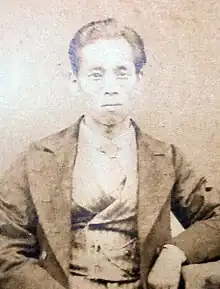
Tashiro Furukawa
Tashiro Furukawa (古河太四郎, Furukawa Tashirō, March 27, 1845 – December 26, 1907) was a Japanese educator. He was a pioneer of education for visual and hearing-impaired people in modern Japan, and has been called "the De l'Épée and Gallaudet of Japan".[1] He initially taught at the Taiken Primary School in Kyoto and began teaching deaf students there in 1873. His teaching methods were published in a governmental publication several years later.[2] He founded the Kyoto Moain (later Kyoto Prefectural School for the Blind and Kyoto Prefectural School for the Deaf) in 1878, and developed the origins of Japanese Sign Language.[3][4]
Furukawa was featured in a Google Doodle on March 26, 2015.[5][6]
References
- ↑ "Our Japanese Visitor". The Deaf-Mutes' Journal. LIX (10): 4. March 6, 1930.
- ↑ Outline of the Tokyo Government School for the Blind. 1936. p. 4. OCLC 42883102.
- ↑ Gertz, Genie; Boudreault, Patrick (2016-01-05). The SAGE Deaf Studies Encyclopedia. SAGE Publications. ISBN 9781506341668.
- ↑ Minami, Masahiko (2016-01-15). Handbook of Japanese Applied Linguistics. Walter de Gruyter GmbH & Co KG. ISBN 9781501500800.
- ↑ "Furukawa Tashiro: 170th Birthday of the First Teacher of Deaf Children | Doodle Finder". doodlefinder.org. Archived from the original on 2019-01-30. Retrieved 2019-01-30.
- ↑ Tashiro Furukawa's 170th Birthday, retrieved 2022-10-18
This article is issued from Wikipedia. The text is licensed under Creative Commons - Attribution - Sharealike. Additional terms may apply for the media files.